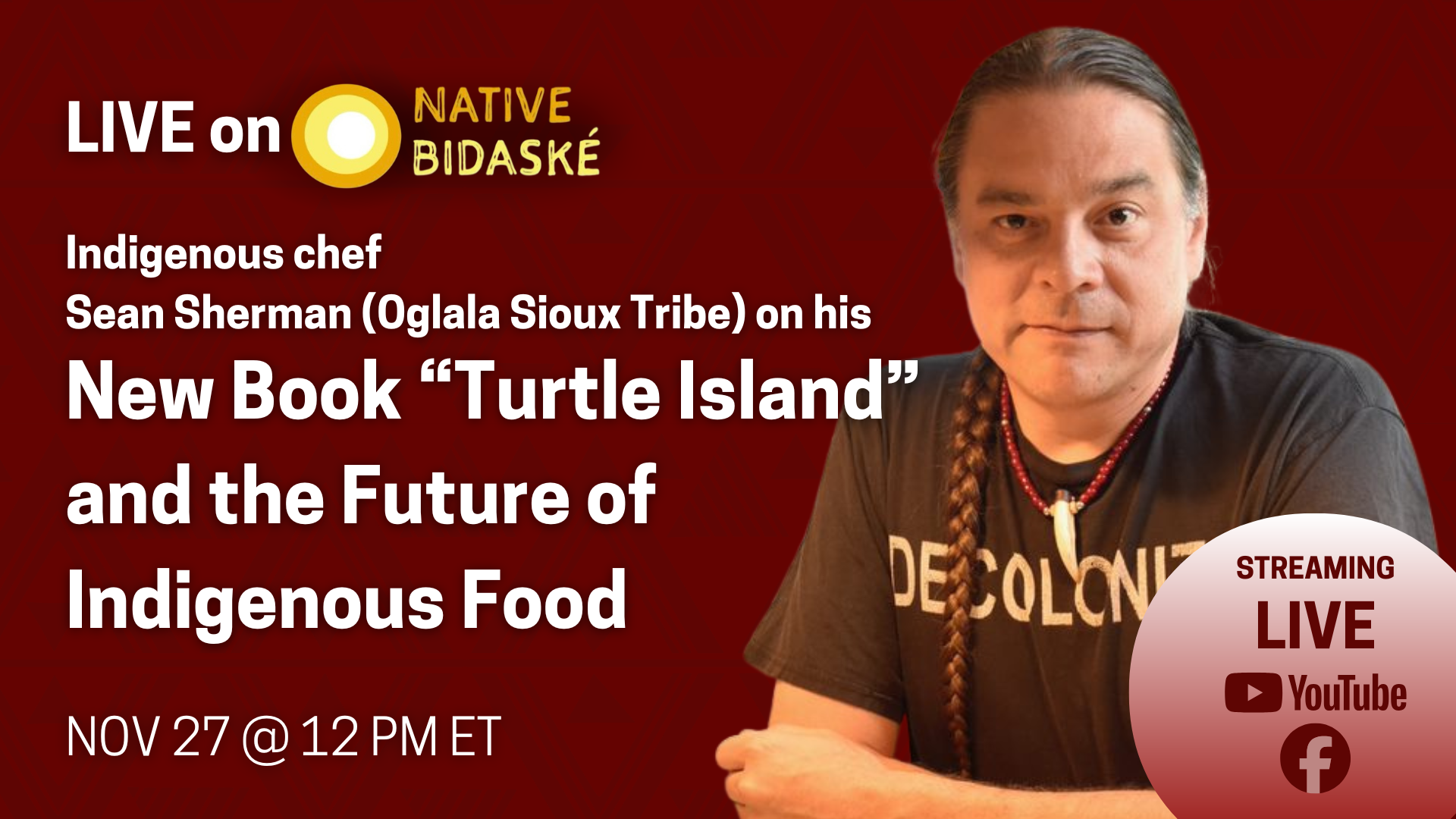
- Details
- By Native StoryLab
Indigenous chef and author Sean Sherman joins Levi Rickert and Shaun Griswold on this week’s Native Bidaske to share the story behind his new book, “Turtle Island: Foods and Traditions of the Indigenous Peoples of North America”, and to explain why reclaiming Indigenous foodways is essential for the health and sovereignty of Native communities.
Sherman—known for co-founding Owamni, one of the most celebrated Indigenous restaurants in the country—says the work starts with moving past the foods that outsiders assume define Native cuisine.
Turtle Island takes readers through those regional differences, celebrating the diversity of Indigenous agriculture, wild foods, and cooking traditions across the continent. The conversation also covers Sherman's nonprofit organization, NATIFS (North American Traditional Indigenous Food Systems), which has become a powerful engine for rebuilding Native food economies.
Sherman’s restaurant, Owamni, continues to sell out nightly, and Sherman hopes its success opens doors for more Indigenous restaurants, food products, and food education across mainstream spaces. He encourages viewers to actively support Indigenous-owned businesses, food producers, and media outlets doing the work to uplift Native voices.
👉 Join us for this conversation on Native Bidaské
Date: Thursday, November 27th, 2025
Time: 12:00 p.m. ET / 11:00 a.m. CT / 10:00 a.m. MT / 9:00 a.m. PT
Streaming on: Facebook, YouTube, and the Native News Online website
Help us tell the stories that could save Native languages and food traditions
At a critical moment for Indian Country, Native News Online is embarking on our most ambitious reporting project yet: "Cultivating Culture," a three-year investigation into two forces shaping Native community survival—food sovereignty and language revitalization.
The devastating impact of COVID-19 accelerated the loss of Native elders and with them, irreplaceable cultural knowledge. Yet across tribal communities, innovative leaders are fighting back, reclaiming traditional food systems and breathing new life into Native languages. These aren't just cultural preservation efforts—they're powerful pathways to community health, healing, and resilience.
Our dedicated reporting team will spend three years documenting these stories through on-the-ground reporting in 18 tribal communities, producing over 200 in-depth stories, 18 podcast episodes, and multimedia content that amplifies Indigenous voices. We'll show policymakers, funders, and allies how cultural restoration directly impacts physical and mental wellness while celebrating successful models of sovereignty and self-determination.
This isn't corporate media parachuting into Indian Country for a quick story. This is sustained, relationship-based journalism by Native reporters who understand these communities. It's "Warrior Journalism"—fearless reporting that serves the 5.5 million readers who depend on us for news that mainstream media often ignores.
We need your help right now. While we've secured partial funding, we're still $450,000 short of our three-year budget. Our immediate goal is $25,000 this month to keep this critical work moving forward—funding reporter salaries, travel to remote communities, photography, and the deep reporting these stories deserve.
Every dollar directly supports Indigenous journalists telling Indigenous stories. Whether it's $5 or $50, your contribution ensures these vital narratives of resilience, innovation, and hope don't disappear into silence.
 The stakes couldn't be higher. Native languages are being lost at an alarming rate. Food insecurity plagues many tribal communities. But solutions are emerging, and these stories need to be told.
The stakes couldn't be higher. Native languages are being lost at an alarming rate. Food insecurity plagues many tribal communities. But solutions are emerging, and these stories need to be told.
Support independent Native journalism. Fund the stories that matter.
Levi Rickert (Potawatomi), Editor & Publisher
